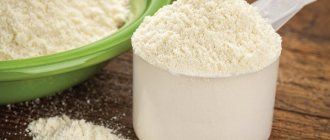People who regularly exercise and watch their figure want the time and effort spent to bear fruit. Therefore, the choice of sports nutrition always remains relevant. But what is better to take for muscle growth: amino acid or protein supplements? After all, it is known that protein, after entering the body, is broken down into amino acids.
That is, in essence, if you take protein, the time for amino acids to enter the blood increases due to the fact that initially this dietary supplement enters the stomach, and only then it breaks down and begins to be absorbed, and only then enters the blood. It appears that taking amino acids in ready-made form is better, but is this really so?
How are amino acids different from protein?
If we talk about structural differences, then amino acids are simpler substances. In fact, amines are proteins, only in a split form. Each protein in our body consists of 20 amino acids, which, during protein synthesis, are separated from it and enter the general blood stream.
From this it turns out that the difference between amino acids and proteins is that the latter take longer to digest. And that is all? Not really, there are a couple more points. Once a protein mixture enters the stomach, be it a shake or a dry powder, it ends up in the gastric juice, where it begins to break down into simpler substances. But since gastric juice is a set of enzymes and hydrochloric acid, staying in it does not pass without a trace. As a result of such processing
Some of the beneficial substances dissolve and do not enter the intestines as an active substance.
Another difference between amino acid complexes and protein powder is the presence of additional impurities. If you take a portion of high-quality dietary supplements of both types and compare them, you can see that there is nothing in the amino acid complex except amines. In protein powder you can find: dyes, flavors and flavor enhancers. This is all added to the powder mixture to give it a pleasant taste.
This is largely why the average price of amino acids can exceed the cost of protein mixtures.
Which is better, amino acids or protein: comparing the amino acid profile
In order to further strengthen the arguments in favor of the fact that it is better to give preference to high-quality protein rather than individual amino acids, let's estimate how many amino acids are contained in our usual products and compare them with what is offered to us in supplements.
We borrowed the table below from the European Journal of Clinical Nutrition
1, and the whey protein composition was taken from Pure Protein 5.
| Product | Beef | Milk | White rice | Corn | Tofu (soy) | Egg | Whey Protein |
| Amount of protein per 100 g | 25.9 | 3.4 | 2.7 | 2.5 | 6.6 | 12.6 | 69 |
| Mass of all amino acids | 25.9 | 3.4 | 2.7 | 2.5 | 6.6 | 12.6 | 69 |
| Alanin | 1.560 | 0.141 | 0.140 | 0.216 | 0.211 | 0.682 | 3.339 |
| Arginine | 1.604 | 0.106 | 0.282 | 0.091 | 0.519 | 0.813 | 1.527 |
| Asparagine | 0.827 | 0.119 | 0.152 | 0.074 | 0.399 | 0.520 | 7.383 |
| Cysteine | 0.384 | 0.040 | 0.052 | 0.067 | 0.190 | 0.367 | 1.707 |
| Glutamine | 1.231 | 0.275 | 0.301 | 0.406 | 0.603 | 0.559 | 9.804 |
| Glycine | 1.396 | 0.063 | 0.114 | 0.061 | 0.220 | 0.387 | 1.185 |
| Histidine | 0.822 | 0.088 | 0.067 | 0.091 | 0.185 | 0.306 | 1.323 |
| Isoleucine | 1.093 | 0.192 | 0.118 | 0.088 | 0.345 | 0.623 | 4.359 |
| Leucine | 2.164 | 0.383 | 0.220 | 0.366 | 0.548 | 0.916 | 7.314 |
| Lysine | 2.160 | 0.211 | 0.079 | 0.037 | 0.432 | 0.904 | 5.952 |
| Methionine | 0.641 | 0.088 | 0.042 | 0.054 | 0.158 | 0.382 | 1.419 |
| Phenylalanine | 1.051 | 0.160 | 0.160 | 0.104 | 0.346 | 0.686 | 2.187 |
| Proline | 1.697 | 0.298 | 0.117 | 0.279 | 0.292 | 0.451 | 4.239 |
| Serin | 1.406 | 0.197 | 0.175 | 0.126 | 0.377 | 1.296 | 3.285 |
| Threonine | 1.166 | 0.142 | 0.090 | 0.103 | 0.235 | 0.535 | 4.668 |
| Tryptophan | 0.352 | 0.046 | 0.032 | 0.017 | 0.065 | 0.203 | 1.182 |
| Tyrosine | 0.937 | 0.164 | 0.136 | 0.093 | 0.175 | 0.495 | 2.049 |
| Valin | 1.339 | 0.218 | 0.177 | 0.139 | 0.259 | 0.781 | 3.969 |
Please note the following:
- all of the listed products (both plant and animal) contain a full set of amino acids;
- in animal products (beef and eggs) the relative proportion of protein (and amino acids) is much greater than in plant products;
- plant products contain tens of times less individual amino acids than animal products;
- whey protein is an amino acid bomb: even one serving of 30 g of whey protein more than covers the amount of amino acids in 100 g of any natural product, including beef.
Let's now practice some arithmetic.
Let's look at an example of one of the most important amino acids for muscle growth (one of the three BCAAs) - leucine.
A common recommendation in bodybuilding is to take 2-3 grams of leucine 2 times a day (for a total of 4-6 grams). This is particularly evident on the first website that came up in the search, myprotein.ru 4.
The table shows that in “beef” equivalent this is 2-3 pieces of beef weighing 100 g or a piece of beef + a protein shake + a few eggs.
In fact, if you consider all the foods that we eat during the day (especially if there is also sports protein in the diet), then it is obvious that there should be more than enough amino acids, even if we take into account that in bodybuilding for building muscle mass they require twice as much as an ordinary person.
The daily requirement for leucine, one of the most important amino acids for muscle growth, can be satisfied by eating 300 g of beef; making it even easier with a protein shake
Pros and cons of amino acids
The first advantage noted earlier is that amino acid supplements do not require digestion. This means that when such dietary supplements enter the body, they begin to be absorbed almost immediately and enter the bloodstream faster. The rate of absorption of amines depends on individual characteristics, but on average it takes 5-10 minutes.
Proteins require additional breakdown and only then enter the small intestine, where they begin to be absorbed. The total time takes about 1 hour.
If we talk about what time of absorption is preferable for the body, then there is almost no difference.
The second advantage is that pure amino acids contain no fats or carbohydrates. That is, sports nutrition in the form of amines is pure protein. On average, protein supplements contain 5-7% fat and 10-15% carbohydrates. Therefore, taking amino acids will be more useful for those who want to lose weight. This is a definite plus for those losing weight and an unpleasant minus for those who want to build muscle mass.
The third advantage is that amino acid supplements are more convenient to take. They do not need to be mixed in a shaker, which you need to carry with you and wash. They do not require additional liquids in the form of milk or other perishable foods. All you need to do is take a few tablets with any water or liquid that you have on hand (with the exception of alcohol). If amines are in powder form, they can also be mixed in any liquid.
Benefits of Amino Acids
Understanding the question of which is better: protein or amino acids, let’s consider what advantages an amino acid sports supplement has.
Amino acids are absorbed much faster than protein and instantly enter the bloodstream.
Amino acid complexes contain significantly fewer impurities than proteins. In addition, most protein supplements contain approximately 15% carbohydrates and 5% fat, which should also be taken into account when choosing whether to use proteins or amino acids.
An undoubted advantage of amino acids is the convenience of taking them, since they are mainly produced in the form of capsules or tablets. Therefore, consuming the drug will only take a couple of seconds, which cannot be said about consuming protein, for the preparation of which you need to use a special shaker.
Pros and cons of protein
As a counter-argument, we suggest that you familiarize yourself with the 3 advantages of protein mixtures, which are in no way inferior to the advantages of your opponent.
The first advantage of protein is that the presence of fats and carbohydrates in mixtures saturates the body better. This means that no matter what your goal is: losing weight or gaining muscle mass, taking protein will be beneficial. In case of weight loss, this dietary supplement can act as a snack. But amino acids cannot do this, because it is quite difficult to saturate the body with tablets.
The second advantage is that some types of protein take a long time to break down. Among them, casein
, which is recommended to be taken during sleep. The fact is that the sleeping body continues to expend the energy necessary for recovery. If there are no simple sources of energy “at hand,” then the body will begin to break down muscle fibers, which is not good.
Casein is good because it is long
proteins, that is, it is able to provide the body with energy throughout the night and preserve muscles. If you consume only amino acids, they will be quickly digested and the body will begin to starve within 1-2 hours.
The third and most important advantage is the cost of protein supplements, which are cheaper than amino acid complexes. If we compare the price range of these products, and take 1 kilogram as the total mass, it turns out that a can of protein on average will cost 500-1000 rubles less than amines.
The difference in cost occurs because additional processing is required to obtain amino acids. That is, the manufacturer needs an artificial stomach
in order to break down proteins and preserve beneficial acids. After this comes the process of pressing into tablets or capsules. As a result, the production of amino acids becomes more expensive, which leads to an increase in market value.
How to take supplements together?
It happens that you cannot do without taking protein mixtures and amino acids, and this is a fairly common practice in bodybuilding. Despite the similarity of the products, BCAA complexes contain amino acids important for muscle growth, which belong to the group of essential amino acids. In protein mixtures their content is low. This is why there is a need to use two types of supplements. But how can you take dietary supplements in this case to get the maximum benefit?
Simultaneous use
These supplements are possible and harmless to health, but still not recommended. The fact is that by consuming two dietary supplements at the same time, the overall effectiveness is lost. Amines do not need to be absorbed, but when they enter the body along with the protein mixture, they form a common food bolus, which begins to be digested in the gastric juice. There is nothing bad about this for protein, but some of the finished amino acids will dissolve in the juice and lose their activity.
Separate reception
dietary supplements is a priority, since in this case both products are absorbed without residue. In this case, first of all, you need to consume amino acids that will enter the blood within 10 minutes. Within 20 minutes after taking acids, you can drink a protein shake.
As a result, amines will not lose their activity due to digestion in gastric juice, and proteins will be able to easily break down into simpler substances.
In this case, there is a scheme that will bring the greatest effect from the use of both mixtures:
- Amino acids are best taken before and after training to add more energy to your muscles. It will also help you recover faster after hard workouts.
- It is recommended to take proteins at a time separate from your workout or 30 minutes after it ends. It would also be a good idea to consume protein containing casein before bed.
Taking these dietary supplements is recommended 3 times a day. The time of administration depends on the training schedule and rest days.
Choosing the best supplement and rules of use
For most athletes, using both supplements will be the best choice. Protein and amino acids must be taken, depending on the specific tasks. For example, for total protein and for post-workout recovery, protein is the best choice. It will quickly close the protein window and become the best option in terms of efficiency and cost.
Amino acid supplements should be used when you need to get the effect as quickly as possible. For example, if you wake up in the morning and go for a run, an amino acid supplement (complex or BCAA) will be of benefit. It is also beneficial to take amino acids instead of protein if your last meal before training did not contain enough protein. In this case, in order to minimize the destruction of muscle tissue during exercise, it is better to drink amino acids before or during training (by stirring a portion in plain water or isotonic water). Glutamine and BCAA are also usually taken before or during exercise, but arginine or citrulline should be consumed 20-30 minutes before exercise.
Protein and amino acids should never be taken together. With this use, the rate of absorption of amino acids will decrease to the rate of absorption of the protein mixture, which makes the more expensive supplement completely useless. For the same reasons, it is better not to drink BCAA and EAA amino acids with protein.
conclusions
In conclusion, it will be useful to draw a line in which to indicate the main conclusions about which supplement is better and what is their fundamental difference.
- If you decide on a specific choice - amines or proteins, then it all depends on personal preferences. For the most part, there are no significant differences between them.
- Amino acids are recommended for those who want to lose weight, and proteins will be useful for those who want to gain muscle mass.
- For muscle growth, essential amino acids are needed, which are found in small quantities in protein supplements.
The result is an interconnected cycle that does not allow us to give an unambiguous answer to all possible cases. Personal recommendation: if you are overweight, it is better to take amines. They will help you lose weight and give your muscles definition. If there is a lack of weight, then proteins are a priority.











